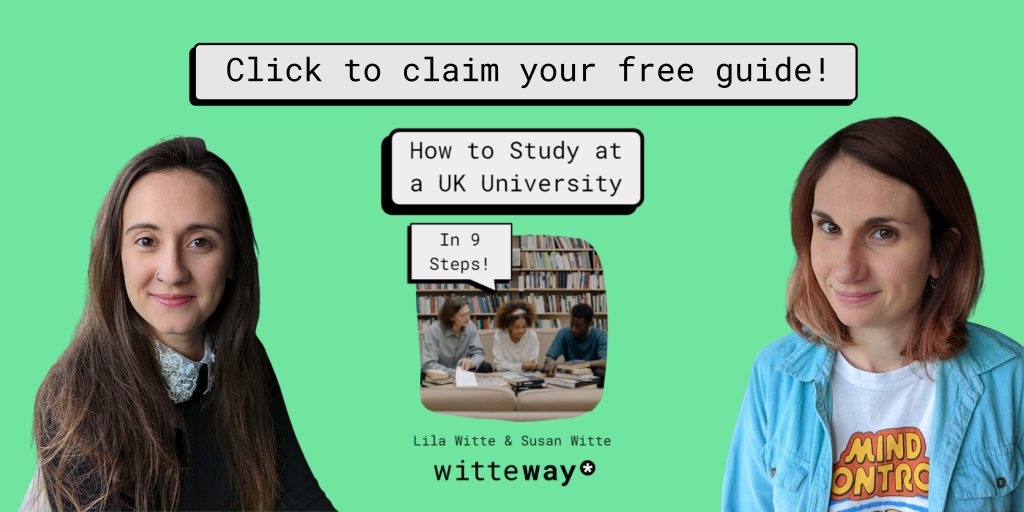I’ve witnessed so many times my students’ struggle to apply for university courses in the UK. The process is confusing, varied and it can take a lot of work. This is why Lila and I created a guide to help people apply more easily. This is a summary of the guide. If you’d like to download the full guide, it is free, just click here.
One general rule to remember is that you need to allow yourself enough time. Rushing can lead to mistakes, missing documents and, ultimately, the loss of an opportunity. Make sure you start early and thoroughly read the information about your chosen course, the university and the application process. Now, let’s break it down into the 9 practical steps:
1 – Pick a course
This may sound a little obvious, but it can be the step that takes the longest. There are so many options, and it is hard to decide which one is the most suitable. There are a few resources which can help you decide:
- The UCAS website has a career quiz to narrow down your choices: https://www.ucas.com/explore/career-quiz
- Prospects has a similar tool: https://www.prospects.ac.uk/planner
2 – Pick the university
There are many things to consider when picking a university, so here are a few tools to aid your decision:
- Top Universities can help you choose yours based on rank, and you can also check which area offers the best student life: https://www.topuniversities.com/
- If you already have a few universities in mind, explore their website to see what they can offer.
3 – Read and understand the course details
If you are not familiar with the UK education system, this part can be quite tricky. It is important to know the level of each course and what they can offer you, as well as the requirements.
- To understand the levels of education in the UK, you can check the government website (note that universities normally offer courses which are level 5 and above): https://www.gov.uk/what-different-qualification-levels-mean/list-of-qualification-levels
- There are courses which are delivered face-to-face (in a university campus normally) and others which are online. There are also blended courses, which means you do part of the course face-to-face and part online. How they are delivered shouldn’t affect the quality of the course, so you should decide based on what you prefer.
- Check the requirements thoroughly and try to have more than what they ask before applying. This will help ensure you get a spot. The university’s website also has information on which qualifications are accepted and what you can do if you don’t have the qualifications asked. For example, you may be asked to do a foundation course or a pre-masters beforehand so that you are more prepared for the course you want to do.
4 – Check that you understand the fees, scholarship opportunities and other funding information.
Tuition fees for undergraduate courses (level 6) are the same for all UK residents: £9250. However, for international students the fees vary depending on the university. Make sure you check beforehand. The fees for graduate courses (level 7 and 8) also vary, so it is important to check this information and what the payment options are for the course you are applying for. Don’t forget to consider living costs in the area. Also, don’t forget that many universities offer scholarships, but they usually require an early application. Start looking into scholarship options 2 years before the course starts, this will give you time to prepare your application and meet the requirements.
5 – Application
Start doing your application early and don’t rush it. Remember to check the deadline for application, and don’t forget there is usually an early deadline if you apply for a scholarship. For undergraduate courses, most people use UCAS to apply, while graduate students usually apply directly on the university’s website. You will probably need to provide information about your education history, employment history, references and a personal statement. Some courses also require something extra, like a portfolio or a sample of your work. Some, like music degrees, may require an audition. Check the application details for your course before you start the process.
- Most people struggle with the personal statement part. Check this website for tips on how to write it: https://www.ucas.com/undergraduate/applying-university/writing-personal-statement/how-write-personal-statement
- Our free guide has lots of tips and a guide on how to structure your personal statement, along with an example.
You will also need to submit your documents. This part can be a bit complicated for international students, because many documents may require an official translation. Check your university requirements ahead of time and allow yourself a lot of extra time to sort out documents, especially because some translations may take a week or longer to be completed.
- You can also check ENIC for translation and validation of qualifications in the UK: https://www.enic.org.uk/
Many universities, depending on the course, may also include an interview as part of the application process. For international students, these are usually done online, so that you don’t have to travel.
- Prospects has some good advice on how to prepare for interviews on their website: https://www.prospects.ac.uk/applying-for-university/getting-into-university/preparing-for-a-university-interview
6 – Check the language requirements
International students from countries where English isn’t the first language usually need to prove their English level is sufficient for a university course. IELTS is the most popular exam for UK university applications. We have a free course on how to prepare for the IELTS: SMASH IELTS.
7 – Dealing with offers
Once you apply, it’s time to wait for an offer. There are two types: conditional and unconditional. An unconditional offer means you’re in. There is nothing left to do but accept the offer and get ready for student life. A conditional offer means they need something from you. It may be that an additional document is needed, or they are still waiting for a minimum IELTS score from you. Once you provide what is missing, you should receive an unconditional offer.
8 – Visas
Once you have an unconditional offer, it is time to sort out your visa. Again, don’t leave this for the last minute because it takes time and can be stressful. You can only apply for a visa once you have been accepted by a university. However, you can look at the requirements ahead of time and start sorting out and translating documents early on.
- Check the UK government website to learn more about student visas: https://www.gov.uk/student-visa
9 – Learn more about the UK
The last step is an important one. Having a good time in the UK might be difficult if you are not familiar with the culture and life here. We post about the UK a lot, and you can find a lot of information online. Allow yourself time to do this calmly and have fun while doing it: watch British TV shows, follow some British lifestyle blogs and social media pages, find online forums about life in the UK, etc. We have more details on our guide, our blog and our Instagram page, so stay tuned!
We hope that you’ve found this guide helpful, and we hope you enjoy student life in the UK! Don’t forget to download the full guide and check out our website for more resources.
Take your English to the next level with our English + IELTS Prep course!





Which step of the journey are you on right now?
Let us know in the comments below!


Recent Comments